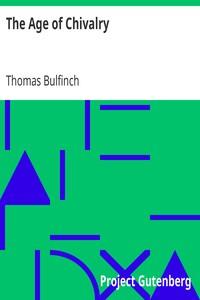|
|
Read this ebook for free! No credit card needed, absolutely nothing to pay.Words: 117023 in 49 pages
This is an ebook sharing website. You can read the uploaded ebooks for free here. No credit cards needed, nothing to pay. If you want to own a digital copy of the ebook, or want to read offline with your favorite ebook-reader, then you can choose to buy and download the ebook.

: The Age of Chivalry by Bulfinch Thomas - Chivalry; Celts Folklore; Arthur King Legends@FreeBooksTue 06 Jun, 2023 KING ARTHUR AND HIS KNIGHTS THE MABINOGEON HERO MYTHS OF THE BRITISH RACE Beowulf Cuchulain, Champion of Ireland Hereward the Wake Robin Hood GLOSSARY KING ARTHUR AND HIS KNIGHTS INTRODUCTION On the decline of the Roman power, about five centuries after Christ, the countries of Northern Europe were left almost destitute of a national government. Numerous chiefs, more or less powerful, held local sway, as far as each could enforce his dominion, and occasionally those chiefs would unite for a common object; but, in ordinary times, they were much more likely to be found in hostility to one another. In such a state of things the rights of the humbler classes of society were at the mercy of every assailant; and it is plain that, without some check upon the lawless power of the chiefs, society must have relapsed into barbarism. Such checks were found, first, in the rivalry of the chiefs themselves, whose mutual jealousy made them restraints upon one another; secondly, in the influence of the Church, which, by every motive, pure or selfish, was pledged to interpose for the protection of the weak; and lastly, in the generosity and sense of right which, however crushed under the weight of passion and selfishness, dwell naturally in the heart of man. From this last source sprang Chivalry, which framed an ideal of the heroic character, combining invincible strength and valor, justice, modesty, loyalty to superiors, courtesy to equals, compassion to weakness, and devotedness to the Church; an ideal which, if never met with in real life, was acknowledged by all as the highest model for emulation. The word "Chivalry" is derived from the French "cheval," a horse. The word "knight," which originally meant boy or servant, was particularly applied to a young man after he was admitted to the privilege of bearing arms. This privilege was conferred on youths of family and fortune only, for the mass of the people were not furnished with arms. The knight then was a mounted warrior, a man of rank, or in the service and maintenance of some man of rank, generally possessing some independent means of support, but often relying mainly on the gratitude of those whom he served for the supply of his wants, and often, no doubt, resorting to the means which power confers on its possessor. In time of war the knight was, with his followers, in the camp of his sovereign, or commanding in the field, or holding some castle for him. In time of peace he was often in attendance at his sovereign's court, gracing with his presence the banquets and tournaments with which princes cheered their leisure. Or he was traversing the country in quest of adventure, professedly bent on redressing wrongs and enforcing rights, sometimes in fulfilment of some vow of religion or of love. These wandering knights were called knights-errant; they were welcome guests in the castles of the nobility, for their presence enlivened the dulness of those secluded abodes, and they were received with honor at the abbeys, which often owed the best part of their revenues to the patronage of the knights; but if no castle or abbey or hermitage were at hand their hardy habits made it not intolerable to them to lie down, supperless, at the foot of some wayside cross, and pass the night. It is evident that the justice administered by such an instrumentality must have been of the rudest description. The force whose legitimate purpose was to redress wrongs might easily be perverted to inflict them Accordingly, we find in the romances, which, however fabulous in facts, are true as pictures of manners, that a knightly castle was often a terror to the surrounding country; that is, dungeons were full of oppressed knights and ladies, waiting for some champion to appear to set them free, or to be ransomed with money; that hosts of idle retainers were ever at hand to enforce their lord's behests, regardless of law and justice; and that the rights of the unarmed multitude were of no account. This contrariety of fact and theory in regard to chivalry will account for the opposite impressions which exist in men's minds respecting it. While it has been the theme of the most fervid eulogium on the one part, it has been as eagerly denounced on the other. On a cool estimate, we cannot but see reason to congratulate ourselves that it has given way in modern times to the reign of law, and that the civil magistrate, if less picturesque, has taken the place of the mailed champion. THE TRAINING OF A KNIGHT Free books android app tbrJar TBR JAR Read Free books online gutenberg More posts by @FreeBooks
: Dry-Farming : A System of Agriculture for Countries under a Low Rainfall by Widtsoe John Andreas - Dry farming Horticulture@FreeBooksTue 06 Jun, 2023
|
Terms of Use Stock Market News! © gutenberg.org.in2025 All Rights reserved.






